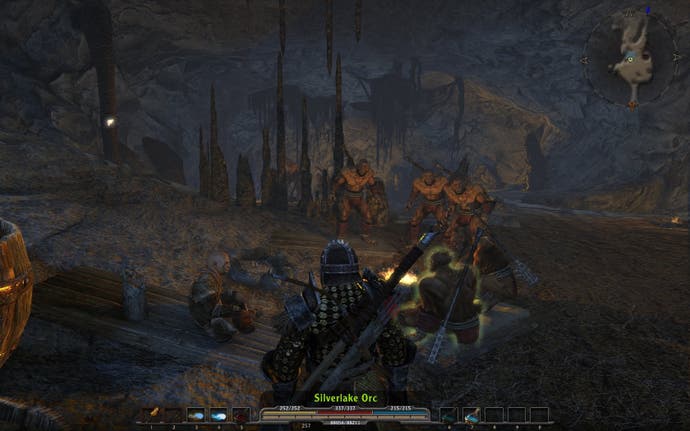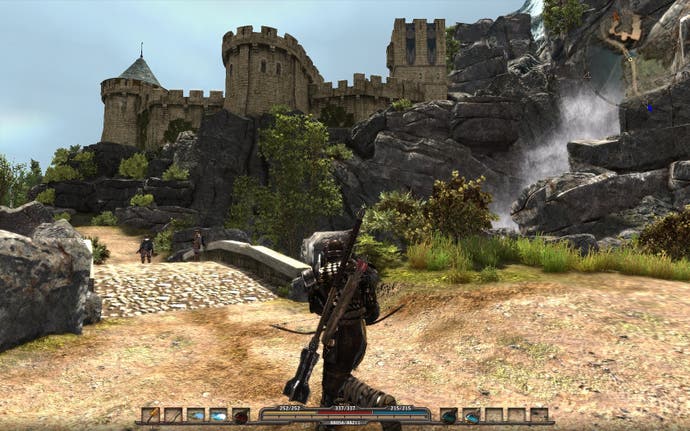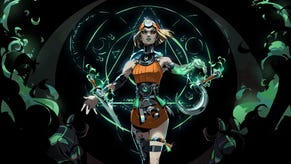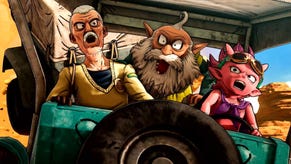Arcania: Gothic 4
Drugdeons and laggards.
You trot off into the wilds to complete the innocuous sub-quest. You return to the NPC, you ask him about the big objective again, and he says something else now needs to be done, which involves someone else. Another sub-quest. A new NPC to talk to. Mission complete, you ask the new NPC about your key objective. He says he can help, but only if you do something for him. Could you maybe...?
On and on it branches. Arcania consistently highlights important objectives down the road, then clutters your path with a series of busywork roadblocks. And really, that's nothing new; RPGs do this all the time. But it's a question of presentation, and a sense of performing worthy activities.
Fallout 3, for instance, gives you overarching goals, but it never boxes you into feeling that the in-between steps are obstacles to progress or simply irrelevant. Each step feels like a big step, a worthy step, a uniquely world-changing step. Staggeringly, Arcania's main character starts getting shirty with NPCs at this constant series of interferences. It's like a guilty acknowledgement from the scriptwriters.
At one stage I was on the trail of two mages, the only characters in the world who could help me to reach an utterly crucial location. One key NPC on the trail demanded I head back into that awful bloody wobble-forest, which I'd already criss-crossed numerous, bilious times on other minor tasks, to find his lost hat.

Let me get this straight. I'm wearing more metal than a commercial airliner, there's fire dripping from my fingertips and I'm brandishing a polearm the size of a tree. I'm a walking war-god on a quest to save the world, and you're asking me to find... your lost hat?
How about I pull your head off? Then you won't need your hat.
Combat and character development are simple and competent enough, and the obvious specialisation pathways are there: archery, melee and spellwork. A career in the magical arts lacks any real intricacy however, as there are just three combat spells: fire, ice and lightning bolts. This actually makes you less versatile than a dedicated archer, who has access to a wider range of effects through special arrow-types. However, keen attendance to side-quests sees you level frequently, and the proliferation of skill-points means that you can just about get away with being a jack-of-all-trades.
It's worth reiterating that the loot is frequently paltry. Every now and then you'll slay a named NPC, and he'll drop something useful with a neat effect. Everything else is cash-trash, and you'll cart wagon-loads of it to the traders who, woefully understocked with interesting gear themselves, will give you a pauper's fee for your swag.

Alchemical crafting can be useful, as the wide range of elixirs and potions you can make really do have an impact on your combat effectiveness. Weapon crafting, however, seems largely pointless. In 17 hours of play, no craftable weapon I found blueprints for beat what was strapped to my back, and the grind required to locate the correct combination of materials sealed the deal. For all its faults, even Two Worlds had the carrot-and-stick of quality loot to help you feel like you were making some meaningful, empowering progress.
What Two Worlds and Arcania do share is the same grade of voice direction. Arcania's menagerie of gabbling harridans and campy village idiots, with their laboured regional accents and daft intonation, make it sound for all the world like an episode of Horrible Histories. A really cut-rate episode.
Beneath Arcania's often outstanding art direction and technical achievement lies a dry spreadsheet of must-have RPG elements, none of which is sufficiently developed to compel and all of which fail to balance against one another. But its ultimate failing is that it treats you like a heel. It neither mentally nor materially rewards the player, which is absolutely fundamental to an enjoyable RPG.
Arcania: Gothic 4 is available now for PC on Steam. The PC and Xbox 360 versions will be available in shops on 29th October. The PS3 version is due in early 2011.








